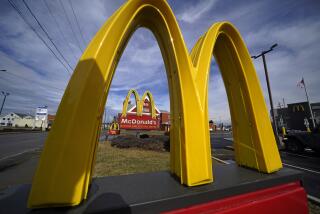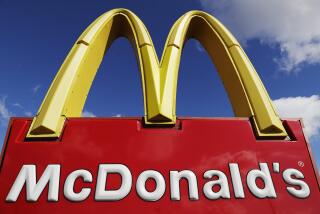Fast Food, Fast Cars and the Need for Fast Thinking
- Share via
What’s in a name? Billions of dollars, clearly.
The stock of McDonald’s has risen almost 20% in the last week, adding nearly $7 billion in stock market value, because investment managers believe the restaurant company’s management will revive one of the world’s best-known brand franchises.
Also last week, BMW, the German car maker with a world-leading brand of its own, agreed to pay $571 million for Rolls-Royce, the emblematic British manufacturer of luxury cars. As Rolls makes only 2,000 cars a year, the perceived value is clearly in its name.
Brand names, not surprisingly, are increasing in value as markets expand globally. A well-known name in one country, particularly the U.S., often becomes a top seller in all countries.
But marketing recognition is often equated with investment success--and that’s not as certain. “Buy Coca-Cola and don’t worry,” say many investment advisors. Occasionally, Warren Buffett is cited as an authority for that proposition because he is a prominent investor in Coke and Gillette.
But business is not that simple. A brand name is not a long-term guarantee but a fragile creature that must be replenished and renewed by the company behind it. Unless management adapts to changes in tastes and markets, even the best brands can become faded stars. Smart investors know this. Buffett, for example, continues to own stock in Coke and Gillette because their managements have renewed the franchise time and again.
But he is reported to have sold McDonald’s stock because management went to sleep at the counter. Profit growth slowed at the restaurant chain three years ago and the stock languished from 1995 until last week.
Which brings us to the real business dramas behind the household names we find familiar.
How did BMW, only 20 years ago a somewhat obscure car company named Bavarian Motor Works, grow to worldwide prominence? And what does its latest move mean?
And what accounts for the rise in McDonald’s stock? Is hope of revival well-founded?
If we can answer those questions, we can get a pretty good idea of how to judge whether a company is still vital or living on past glories.
BMW has remained a leading car company because it has changed in response to competition several times. The first change occurred in 1970, when Chairman Eberhard von Kuhnheim saw, before most car makers, that Japanese manufacturers would come to dominate the world’s mid-size-car markets. So he directed BMW to develop a highly engineered automobile for sophisticated drivers, and he marketed it in competition with luxury brands such as Mercedes-Benz and Cadillac.
He succeeded. BMW became a luxury competitor of Mercedes, its brand name occupying a new niche in public acceptance. And Cadillac faded because it didn’t change its style or reach out for younger customers.
But then Toyota developed the Lexus, challenging the luxury field. BMW sales fell in the U.S. in the 1980s and early ‘90s because shifting values for the German mark made BMW’s prices too high.
So in 1992 the Munich-based company reformed its approach. It built a factory in South Carolina to escape German labor costs. And it widened its range of cars, bringing out models selling for less than $30,000 to attract younger buyers. Its action signaled a broadening of the global middle class.
Why is it buying Rolls-Royce? “BMW wants to include several brand names in its portfolio. As the car industry consolidates to fewer brands, recognizable names will be at a premium,” says Doug Kevorkian, a Detroit-based independent automotive consultant.
BMW’s current chairman, Bernd Pischetsrieder, wants to revive the Mini car, a 1970s success owned by BMW’s Rover subsidiary. His idea is that BMW, now at $29 billion in annual sales worldwide, should present a full line to car buyers, from economy to luxury. So BMW is remaking itself once again in response to its idea of where car markets are headed.
Such change impresses investors: BMW’s share price on the Frankfurt stock exchange has tripled since 1993.
McDonald’s didn’t invent fast food, but it did perfect it, with efficient delivery systems, high standards of cleanliness, innovative offerings such as the Big Mac and good French fries.
Its business model was very popular and profitable, and it spread worldwide. McDonald’s now has operations in 101 countries that produce 49% of its $11.4 billion in sales and almost 60% of its $1.6 billion in profit.
But other fast-food chains--Burger King, Wendy’s and local chains such as Carl’s Jr. and In-N-Out--long ago adapted McDonald’s efficiencies and attention to cleanliness. And for years they have been luring its customers with tastier and more varied food.
McDonald’s actions to defend its brand by cutting prices proved unimaginative and even hurtful to franchise operators. Attempts to attract older diners with deluxe sandwiches didn’t succeed, nor did experiments with pizza and Mexican specialties.
The real problem, however, was not food but management stuck in its ways. “We don’t have to change. We have the most successful brand in the world,” Chairman Michael Quinlan told BusinessWeek recently.
Yet investor discontent and lagging earnings growth seem to have changed minds. Just over a week ago, the Oak Brook, Ill.-based company announced a program of heavy investment in a computerized cooking system that will keep food tastier and allow McDonald’s to vary the menu.
That and a declaration that management will cut costs at headquarters persuaded many analysts that McDonald’s would really make a comeback this time. That’s why the stock rose from $53 a share to $63.50 in a week.
Yet some remain skeptical. Analyst Dean Haskell of Chicago’s Everen Securities thinks the new cooking system will increase customers’ waiting time and McDonald’s costs, yet not attract the new customers the chain needs.
And others wonder whether management isn’t just thinking of new ways to serve food, not how to do things differently. “It has one of the world’s great franchises for serving families and children,” says consultant Adrian Slywotzky of Mercer Management Consulting in Cambridge, Mass. “Management should be asking what families and children will want from McDonald’s in the next five years.”
Is McDonald’s really embarked on a successful new course? The answer will be clear in the next year or two, in both company earnings and global image. Meanwhile, investors should recognize that there’s more behind a brand name than mere familiarity.
*
James Flanigan can be reached at jim.flanigan@latimes.com
More to Read
Inside the business of entertainment
The Wide Shot brings you news, analysis and insights on everything from streaming wars to production — and what it all means for the future.
You may occasionally receive promotional content from the Los Angeles Times.










